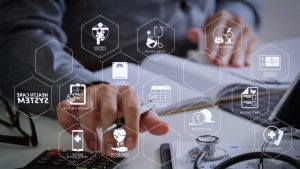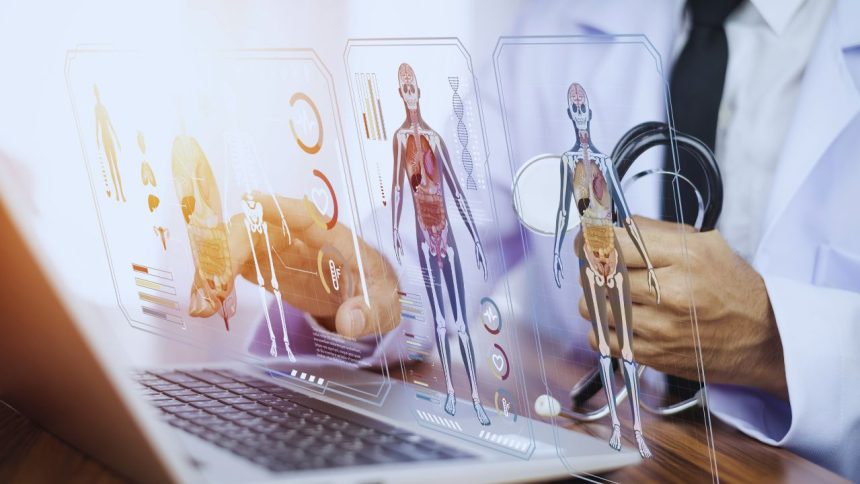Artificial Intelligence (AI) has emerged as a revolutionary force, reshaping various industries, and healthcare is no exception. This article delves into the profound influence of AI on the future of healthcare, exploring its historical evolution, current applications, challenges, and future trends.
Introduction
In recent years, the integration of Artificial Intelligence (AI) in healthcare has paved the way for unprecedented advancements. The intersection of cutting-edge technology and medical science holds the promise of transforming the way we approach healthcare.
Historical Perspective
The journey of AI in healthcare dates back several decades, marked by significant milestones and breakthroughs. From early expert systems to the contemporary machine learning algorithms, the historical perspective provides valuable insights into the evolution of AI in this critical sector.
Current Applications of AI in Healthcare
Diagnosis and Treatment Recommendations
One of the most impactful applications of AI in healthcare is its ability to enhance diagnostic accuracy. Machine learning algorithms can analyze vast datasets to identify patterns and anomalies, aiding healthcare professionals in making more precise diagnoses.
Predictive Analytics for Patient Outcomes
AI plays a pivotal role in predicting patient outcomes based on historical data. By leveraging predictive analytics, healthcare providers can proactively address potential complications, leading to more effective and personalized patient care.
Robotics in Surgery
Robotic-assisted surgery has redefined precision in the operating room. AI-powered robots, guided by surgeons, enable minimally invasive procedures with unparalleled accuracy, reducing recovery times for patients.
Personalized Medicine
AI’s ability to analyze individual patient data has ushered in the era of personalized medicine. Tailoring treatments based on genetic, lifestyle, and environmental factors enhances therapeutic efficacy and minimizes adverse effects.
Challenges and Concerns
As AI continues to permeate healthcare, ethical considerations and data privacy concerns have come to the forefront. Striking a balance between innovation and safeguarding patient information is imperative for the responsible adoption of AI in healthcare.
Benefits of AI in Healthcare

Improved Accuracy and Efficiency in Diagnosis
The integration of AI significantly improves diagnostic accuracy by rapidly processing vast datasets. This not only reduces the margin of error but also expedites the diagnostic process, leading to timely interventions.
Enhanced Treatment Planning
AI-driven algorithms aid healthcare professionals in devising comprehensive treatment plans. By considering a multitude of factors, including patient history and genetic predispositions, AI contributes to more effective and personalized treatment strategies.
Streamlined Administrative Processes
Automation through AI streamlines administrative tasks, allowing healthcare professionals to focus more on patient care. From appointment scheduling to billing, AI enhances efficiency across various operational aspects of healthcare.
AI and Telemedicine
The synergy between AI and telemedicine has revolutionized the accessibility and delivery of healthcare services. Virtual health assistants powered by AI facilitate remote consultations, enabling patients to receive timely medical advice from the comfort of their homes.
Facilitating Remote Healthcare Services
AI-driven telemedicine solutions bridge geographical gaps, ensuring that even individuals in remote areas have access to quality healthcare. This is particularly crucial for routine consultations and follow-ups.
Virtual Health Assistants
Virtual health assistants powered by AI not only assist in scheduling appointments but also provide preliminary information about symptoms, medications, and preventive measures. This enhances the overall patient experience and engagement.
Also Read: How To Use ChatGPT Without Login In 2023
Future Trends in AI and Healthcare
The evolution of AI in healthcare is an ongoing process, with several exciting trends on the horizon.
Advancements in Predictive Modeling
Future developments in predictive modeling will enable more accurate forecasting of diseases and their progression. This proactive approach will empower healthcare professionals to implement preventive measures effectively.
Integration with Wearable Devices
The integration of AI with wearable devices opens new avenues for continuous health monitoring. From real-time vital sign tracking to early detection of abnormalities, wearables powered by AI contribute to proactive healthcare.
AI-Driven Drug Discovery
The pharmaceutical industry stands to benefit significantly from AI-driven drug discovery. Machine learning algorithms can analyze vast datasets to identify potential drug candidates, expediting the drug development process.
The Impact on Healthcare Professionals
As AI becomes more ingrained in healthcare, the roles and responsibilities of healthcare professionals are evolving.
Changing Roles and Responsibilities
Healthcare professionals are increasingly becoming collaborators with AI systems, relying on data-driven insights to make informed decisions. This shift in roles necessitates ongoing training and education to ensure a seamless integration of AI into daily practices.
Training and Education in AI for Healthcare Professionals
The integration of AI in healthcare requires a workforce that is well-versed in both medical principles and technological advancements. Training programs and educational initiatives are crucial to equip healthcare professionals with the skills needed to leverage AI effectively.
AI and Patient Experience
The influence of AI extends beyond medical professionals to the very individuals seeking healthcare services.
Enhanced Patient Engagement
AI facilitates personalized interactions with patients, improving engagement and adherence to treatment plans. Virtual health assistants can provide continuous support, offering valuable information and encouragement throughout a patient’s healthcare journey.
Personalized Healthcare Experiences
From tailored treatment plans to customized health recommendations, AI contributes to a more personalized healthcare experience. This not only enhances patient satisfaction but also improves health outcomes.
Government Regulations and AI in Healthcare
The rapid integration of AI in healthcare necessitates a robust regulatory framework to address ethical and safety concerns.
Compliance and Regulatory Framework
Governments worldwide are working to establish comprehensive regulatory frameworks to govern the ethical use of AI in healthcare. Striking a balance between fostering innovation and ensuring patient safety remains a priority.
Balancing Innovation and Patient Safety
Ensuring the responsible development and deployment of AI in healthcare requires a delicate balance between fostering innovation and safeguarding patient well-being. Ethical considerations and adherence to established regulations are crucial in achieving this equilibrium.
Global Initiatives and Collaborations
International collaboration plays a pivotal role in harnessing the full potential of AI in healthcare.
International Efforts to Leverage AI in Healthcare
Countries around the world are engaging in collaborative efforts to share knowledge and best practices in AI-driven healthcare solutions. This collective approach accelerates advancements and ensures a global perspective on healthcare challenges.
Collaborations Between Tech Companies and Healthcare Institutions
Partnerships between technology companies and healthcare institutions are instrumental in driving innovation. These collaborations bring together expertise from both domains, fostering the development of cutting-edge solutions for the benefit of patients worldwide.
Case Studies
Examining real-world examples of successful AI implementations in healthcare provides valuable insights.
Highlighting Successful AI Implementations in Healthcare
Case studies showcase how AI has positively impacted healthcare delivery. From improved diagnostic accuracy to innovative treatment approaches, these examples demonstrate the tangible benefits of AI in diverse healthcare settings.
Learning from Real-World Examples
Analyzing the successes and challenges faced by early adopters of AI in healthcare provides valuable lessons for future implementations. Understanding these real-world examples informs best practices and guides the ongoing evolution of AI in healthcare.
AI’s Role in Public Health
Beyond individual patient care, AI has a crucial role in shaping public health strategies.
Disease Surveillance and Early Detection
AI-powered systems contribute to timely disease surveillance and early detection, enabling proactive public health interventions. This is particularly relevant in managing outbreaks and preventing the spread of infectious diseases.
Pandemic Response and Management
The experience of global pandemics has underscored the importance of AI in predicting, managing, and responding to healthcare crises. AI-driven models aid in predicting disease trajectories, optimizing resource allocation, and facilitating rapid response measures.
Investments in AI Healthcare Startups
The growing interest in AI in healthcare is reflected in the increasing investments in startups.
Trends in Funding and Investment
Venture capital and institutional investors are actively supporting AI healthcare startups. This influx of funding accelerates research and development efforts, propelling the industry towards new and innovative solutions.
Emerging Players in the AI Healthcare Space
Identifying key players in the AI healthcare space provides insights into the future landscape of the industry. From startups to established companies, the diversity of contributors fosters a dynamic and competitive environment.
Conclusion
In conclusion, the role of Artificial Intelligence in shaping the future of healthcare is both transformative and promising. From improving diagnostic accuracy and personalized treatment plans to revolutionizing public health strategies, AI is a catalyst for positive change.
FAQs
- Is AI fully replacing human healthcare professionals?
- No, AI is designed to assist healthcare professionals, enhancing their capabilities rather than replacing them entirely.
- How is patient data protected in AI-driven healthcare systems?
- Stringent measures, including encryption and access controls, are implemented to safeguard patient data in AI applications.
- Can AI predict outbreaks of infectious diseases?
- Yes, AI’s predictive modeling capabilities play a crucial role in early detection and management of infectious disease outbreaks.
- What are the ethical considerations in AI and healthcare?
- Ethical considerations include privacy concerns, transparency in AI algorithms, and ensuring unbiased decision-making.
- How can healthcare professionals stay updated on AI advancements?
- Continuous training programs and educational initiatives help healthcare professionals stay abreast of AI advancements in the healthcare sector.




